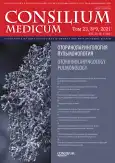Vol 23, No 9 (2021)
- Year: 2021
- Published: 15.09.2021
- Articles: 12
- URL: https://consilium.orscience.ru/2075-1753/issue/view/4876
Full Issue
Articles
Extracellular traps as an important part of the pathogenesis in chronic rhinosinusitis
Abstract
 395-399
395-399


The relevance of the situational use of nasal decongestants in modern clinical practice
Abstract
Nasal decongestants (ND) are representatives of the pharmacological group of а-adrenomimetics and are widely used in clinical practice. These drugs are successfully used as symptomatic therapy of acute rhinosinusitis (AR), as well as as part of the complex therapy of acute otitis during unloading therapy for the auditory tube. The use of ND is necessary before conducting an endoscopic examination of the nasal cavity, for a better assessment of the state of the ostiomeatal complex, the olfactory cleft, as well as differential diagnosis of various forms of rhinitis and dysosmia. ND are indispensable in the prevention of complications of AR, such as acute eustachiitis, exudative otitis media and acute otitis media. Also, these drugs are used in the prevention of the development of aerotitis and ear barotrauma. The most commonly used nasal medications of medium and long duration of action, such as xylometazoline and oxymetazoline. This article presents clinical studies demonstrating the high efficacy and safety of these drugs as part of the treatment of AR. It is shown that oxymetazoline and xylometazoline are well tolerated by patients with a minimum number of adverse events. Modern representatives of ND are such drugs as Otrivin express 0.05% with the aroma of menthol, the main active ingredient of which is oxymetazoline, Otrivin 0.1% Moisturizing formula and Otrivin 0.1% with menthol and eucalyptus, which includes xylometazoline as the main active ingredient. These drugs have confirmed their effectiveness and safety in a large number of clinical studies and can be recommended as local vasoconstrictors.
 400-405
400-405


Smoking effect in patients following benign laryngeal lesions excision
Abstract
 406-409
406-409


Relationship between the state of the lymphoid-pharyngeal ring and xerostomia syndrome
Abstract
 410-420
410-420


Intranasal fluticasone propionate in the pharmacotherapy of allergic rhinitis
Abstract
 421-429
421-429


Review of the experience of using herbal drugs for the treatment of acute rhinosinusitis from the standpoint of evidence-based medicine
Abstract
 430-440
430-440


Upper respiratory tract diseases in patients with cystic fibrosis
Abstract
Among ENT organ diseases in patients with cystic fibrosis, chronic rhinosinusitis is leading. The respiratory epithelium lining the surface of the upper and lower respiratory tract has the same structure. And as a result, in patients with cystic fibrosis, along with the bronchial tree, the upper respiratory tract is involved in the inflammatory process, while chronic rhinosinusitis develops. Impaired drainage leads to stagnation of infected thick mucus. Timely examination and treatment of upper respiratory pathology in patients with cystic fibrosis is needed. In surgical treatment, the method of choice is extended FESS. Observation by an ENT physician and conservative treatment of polypose rhinosinusitis should be carried out throughout the life of a patient with cystic fibrosis.
 441-444
441-444


A study of the potential of medicinalplant extracts in suppression of SARS-CoV-2 replication: a pilot study
Abstract
 445-450
445-450


Allergic rhinitis and bronchial asthma: a double blow to the respiratory system. How to achieve control
Abstract
 451-459
451-459


Mesenchymal stem cells in tuberculosis therapy
Abstract
 462-465
462-465


Levofloxacin in the treatment of community-acquired infections of the lower respiratory tract: a look through a quarter of a century
Abstract
 466-476
466-476


Clinical observation of the course of new coronavirus infection in a patient with subacute form of hypersensitive pneumonitis
 477-479
477-479











